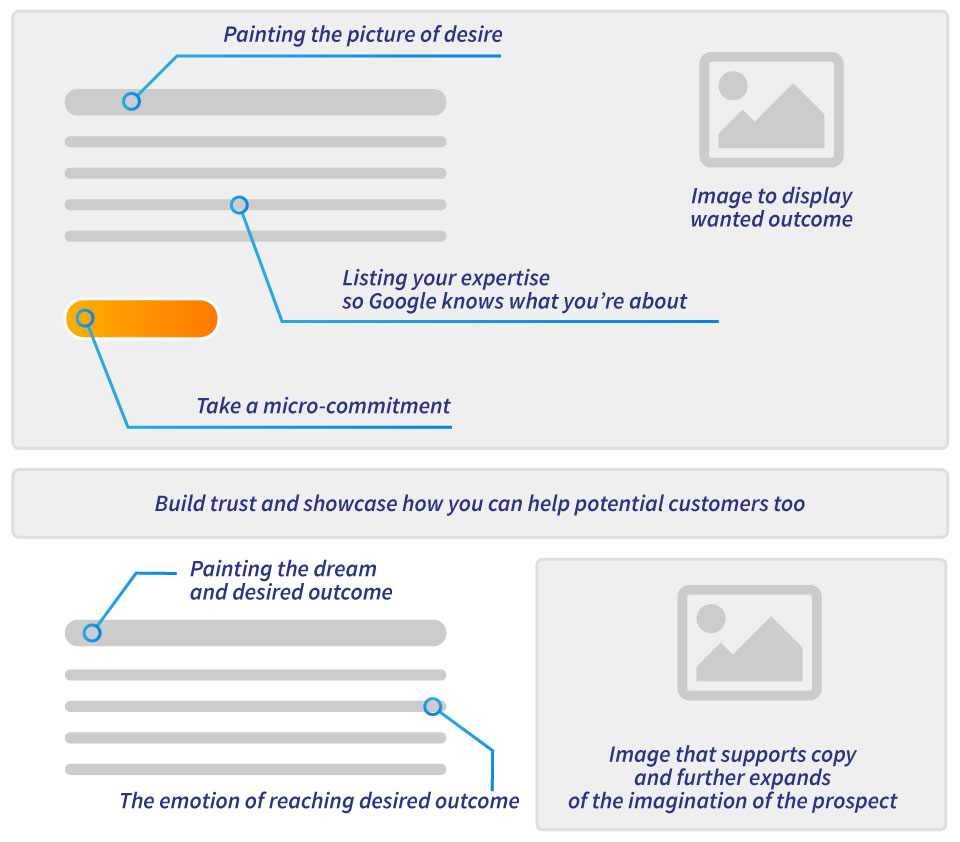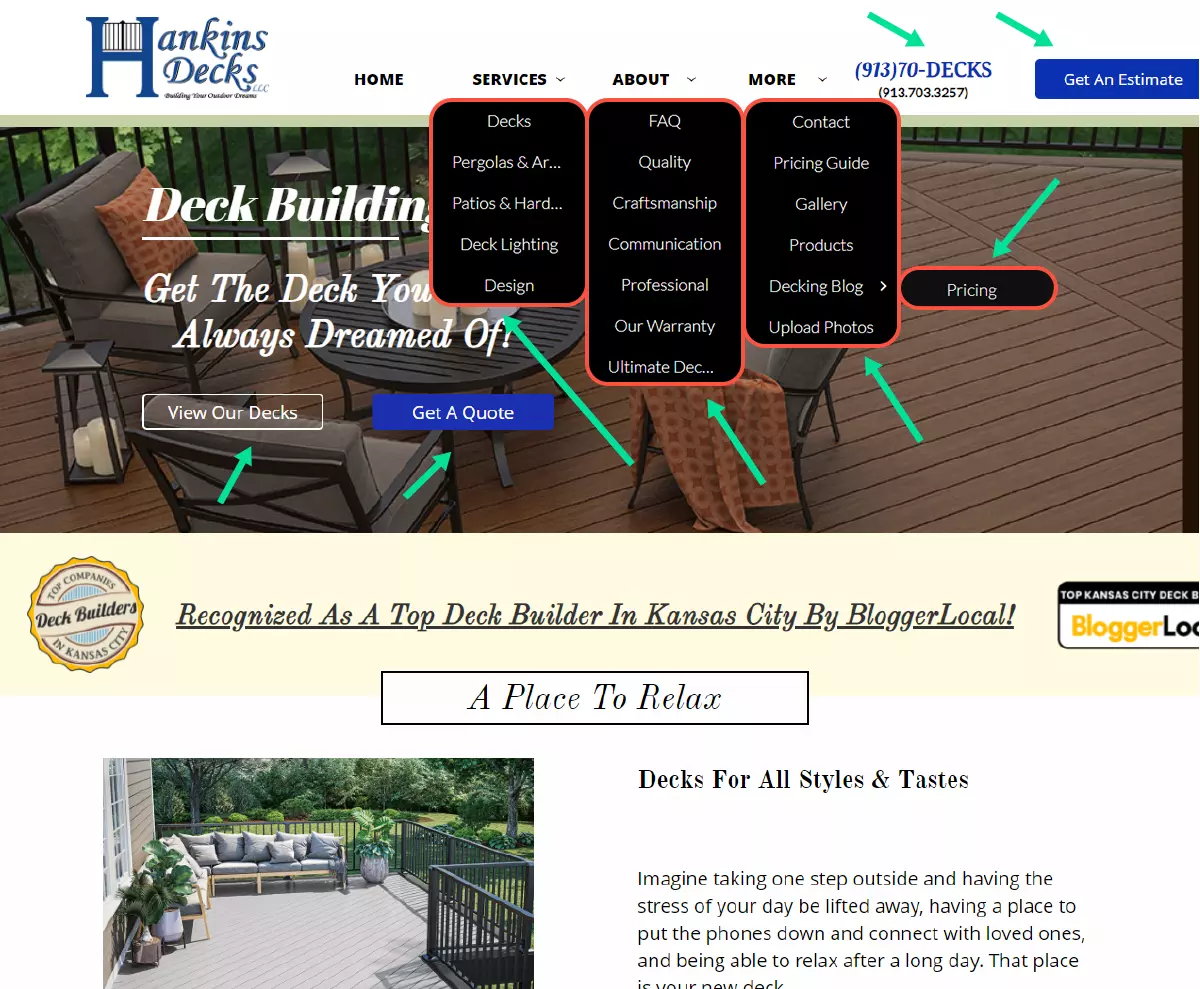Websites are the equivalent of your business card in the online world. They showcase who you are, your company’s values and present your past work in a way that attracts potential customers. However, they’re not enough!
Even though websites are a common practice for all contracting businesses, they are no longer the only tools you need. When it comes to attracting clients, landing pages are 2x times more efficient in converting homeowners into clients.
In this article, we’ll explore the difference between landing pages and websites and why the landing page is a leading generation tool that you need for your contracting company.
What Is a Landing Page?
Landing pages represent a clear and actionable stage in the buyer’s journey. They are used to support ad campaigns and channel all that traffic toward conversion. In other words, if a homeowner sees your ad on kitchen remodeling and clicks on it, they will be directed to a landing page that features that specific service.
A landing page has a few clear incentives that work in its favor:
- Targeted audience
- Primary goal is conversion
- Focus on a particular service
- Easy to understand by customers
- Consistent copy and design
What makes landing pages work is their unique structure. It’s a customized experience that keeps users focused on one goal: reaching the bottom of the page. And with each step, it encourages homeowners to submit their details for a quote.
Landing pages are supported by a long list of things that are happening in the background. They cover everything from painting a clear path the prospect wants to follow to encouraging readers to choose your services.

What Is a Website?
Websites have a much simpler approach. They are a set of interconnected pages that aim to offer information about your business. They encourage visitors to look at who you are from different points of view.
For contractors, this translates into having multiple pages where you showcase information about your company. A few examples of this would be:
Homepage
Your homepage encompasses the entire journey a homeowner takes on your website. It showcases why your business is the best and why it can be trusted, as well as plenty of benefit-oriented service descriptions, company values, and a strong call to action.
In other words, with each section, your prospect has to get closer to submitting their details and arranging an appointment.
Service Page
The purpose of your service page is to educate your costumers on your services. It is an opportunity to convince them that your service will be the solution to their problem. Keep in mind that the writing should always be about benefiting the client.
If the homepage acts as a simple introduction, these pages will dive deeper into why a homeowner needs your service, what is the benefit of hiring you and how they can make the trade.
About Page
This is where clients really get to know who you are and how it benefits them. It is no secret that oftentimes there is a trust gap between homeowners and contractors. This page aims to bring the two sides together.
Try highlighting the background of your business, your core values, and what drives your team. It’s important to let homeowners know why you chose this line of work and how much pride you put into your job. This way you “humanize” your business and show them it’s a person-to-person relationship.
Portfolio
A necessary part of any contractor website is the portfolio page. Clients need to see examples of your past work to understand your value. The more you show, the better are your chances of getting hired.
Educational Pages
Landing Pages vs. Websites
When it comes down to the basics, the key difference between landing pages and websites is focus and flow. Truth is, a fancy headline or a neat design isn’t what’s going to make users click the contact button. It’s the overall experience that matters most.
If a website is designed for exploration, a landing page is the equivalent of a one-way trip. The key to a landing page’s successful conversion rate is its clear focus on one specific service. That focus drives the reader’s interest on your offer and eventually nudges them into contacting you.
Even though websites provide more information, a web page isn’t as highly focused on conversions. Why? Because exploration = distraction and distractions are what’s killing marketing campaigns. Keeping a user interested in your offer long enough to convert is what makes landing pages work effectively.
So if your kitchen remodeling ad sends a user to your homepage, chances are they’re going to end up on your About page instead of committing to your service.
Think of a web page as a drainpipe and the traffic coming to it as water. A landing page has only one hole ( the Call-To-Action ) drilled at the bottom so the stream of water naturally flows toward it. A normal web page has multiple holes so you won’t know where that stream will eventually end up. Those extra holes are called “conversion leaks”. Depending on your needs, those holes can be encouraged or removed.
| Website | Landing Page | |
|---|---|---|
| Layout | An extended number of pages | One page |
| Navigation | Accessibility to multiple pages | Limited to no navigation |
| Audience | Users with a general interest in your business | Users with a specific interest in a particular service |
| Information | All the information a client needs to know | Information about a single service |
| Purpose | Showcase your company | Convert potential leads |
Do You Need a Website?
Most business transactions happen on the internet. Not having a website is a straightforward way to kill your own wings before attempting to fly. However, depending on your urgency and requirements a website can come in handy at a later date. Let me explain:
Your website is the ideal place to tell your company’s story and earn the trust of homeowners. It has more room to do this than a landing page. You can use your website to qualify clients, but its main purpose is to provide information, not to sell.
Even though a web page has multiple “holes”, they are needed in the context of a marketing campaign. You want homeowners to navigate across your website and find out as much as they can about your company and services.
Do You Need a Landing Page?
Landing pages satisfy other requirements. If you want to launch a service quickly and gain traction with your online presence, landing pages are a great tool. As a contractor, they’re also the best way to capture potential customers fast. Unlike websites, their primary purpose is to sell.
Going back to our drainpipe analogy, the beauty of a landing page is that it gives you more control over where traffic flows and where your investments and efforts eventually go. A perfectly tailored landing page leaves less room for pause, fewer distractions and a clear path for homeowners to become your clients.
Is The Investment Worth It?
If you’re thinking of having a website built, prices usually vary depending on the complexity of the site, its purpose, and the agency building it. You’re looking at a price range from $100 to $50k and a timeline of one to a few months.
Landing pages, however, are much easier to work with. The time it takes to build one is shorter since we’re only talking about a single page. This means you can spend less money and see results faster. And since landing pages have a higher rate of converting clients than websites, there’s twice as much value in them.
Here at Contracting Empire, we want to give you the results you need as quickly as possible. We build specialized contractor website systems for $9,800 and they take about 4 weeks to complete. We also create specialized landing pages for $2,500 that take 1 week to complete.
But there’s an interesting thing about this:
We’ve made our website system behave like landing pages. There’s a thought-out process and a clear structure behind everything. With just a snap of the fingers, the service page on your website becomes a complete landing page ready to run ads.
And wait, there’s more…
As an added benefit to our clients, you can start with a specialized M.E.E.T.U.P. landing page. Then, if you want to upgrade to our contractor website system, you can use that initial investment from the landing page to work towards your website payment.
We’ve built over 150 contractor website systems in 2021. With our services, you can quickly start converting prospects and gain high-quality clients for your contracting business. If you’d like to know more about how we can help your contracting business grow, let’s have a chat.

Anamaria Coteneanu, Copywriter @ Contracting Empire
By day, Ana is a passionate writer with a knack for understanding what makes your audience tick. She loves delivering compelling copy that showcases your brand’s value and helps your business succeed.
During off hours, she enjoys hosting get-togethers for her friends, diving deep into the art of cocktail-making, and traveling as far as her feet can take her.


